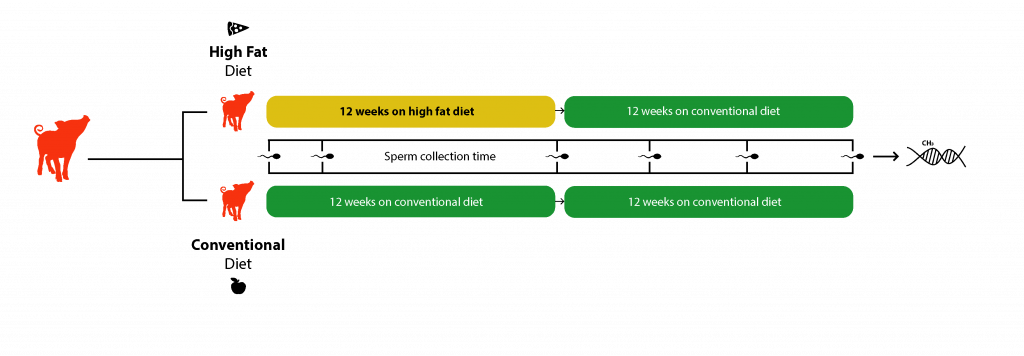EpiPIG is a research study in which we are giving mini-pigs either a ‘Western’ high fat/high sugar diet or a normal pig diet to better understand what epigenetic impact this has on their sperm.
epiPIG
Why?
Metabolic changes in men, such as weight loss in humans and an unhealthy high fat diet in rodents, has been shown to drive epigenetic changes in sperm cells along with changes to the health of their future children.
In this study, we will examine if changes to the diet of male mini pigs alters the epigenetic information carried by their sperm in a way which could affect the epigenetic pattern and/or development of future offspring. We have chosen to study mini pigs due to the biological similarity between pigs and humans. This study will allow us to better understand what epigenetic features of the sperm are conserved throughout evolution, along with deciphering which epigenetic responses to nutritional challenges are unique to humans.
Overall, this study allows us to uncover how exposure of fathers-to-be to certain diets causes changes to the genetic material of their sperm. Understandings gained from this experiment are the first step in determining if and how paternal nutrition shapes offspring predisposition to obesity or disease.

How?
Mini-pigs are fed either a conventional healthy diet or an obesogenic ‘Western diet’ rich in fat, sugar and cholesterol. over the course of three months. This Western Diet is meant to mimic the unhealthy fast food diets, currently consumed by humans in several high-income countries, and causes overeating in the mini pigs, which in turn causes rapid weight gain. We collect sperm samples from the mini pigs at several different time points during the study, including directly prior to and directly after the three-month dietary intervention. The sperm samples are then analysed for epigenetic changes in response to the diets. Thanks to mini-pigs being quite smart, we have been able to train them to mount a ‘dummy sow’ to deliver a natural ejaculate, making the process of collecting sperm easy, safe for the animal and fast!
Study Leaders

Other studies
GeckoTEk
01TEs (Transposable Elements), escape epigenome reprogramming and therefore represent potential hotspots of heritable information that can be passed on to future generations. The Latin suffix –theca (from Ancient Greek thēkē) is used for any kind of collection. The goal of the GeckoTEk project is to generate a near-complete human sperm (epi)genome of high-quality, using third-generation sequencing technologies with a particular focus on difficult genomic regions and repetitive sequences.
3-D Epigenetics
Three-dimensional conformation of genomes
02Three-dimensional conformation of genomes
An ex vivo characterisation of tissue specific epigenetic remodelling in offspring sired from nutritionally challenged fathers. We utilise approaches such as HI-C and ATAC-seq to develop a picture of genetic architecture, and integrate chromatin confirmation and transcriptomic data to determine how epigenetic regulatory elements reshape the genome.
FEAS[Singletons]T
Food intake and Epigenetic Alteration in the Spermatozoa of Singletons and Twins – Singletons Study.
05Food intake and Epigenetic Alteration in the Spermatozoa of Singletons and Twins – Singletons Study.
A human dietary intervention study where participants receive different commonly consumed diet patterns and we are examining the impact it has on epigenetic markers in the sperm. This part of the study is with individual people, singletons.
FEASS[Twins]
Food intake and Epigenetic Alteration in the Spermatozoa of Singletons and Twins – Twins Study.
06Food intake and Epigenetic Alteration in the Spermatozoa of Singletons and Twins – Twins Study.
A human dietary intervention study where participants receive different commonly consumed diet patterns and we are examining the impact it has on epigenetic markers in the sperm. This branch of the study has twin male participants.
geoMOUSE
A nutritional intervention study, using the principles of Nutritional Geometry study with mice
07A nutritional intervention study, using the principles of Nutritional Geometry study with mice
A dietary intervention study in which male mice are given one of 10 diets with different proportions of protein, fat and carbohydrates, and then mated to produce offspring. Following which, we examine the effect of these different diets on the overall health and behaviour of both the males and their offspring. We are especially looking for an epigenetic patterns.
geoMOUSE 2.0
Nutritional study and epigenetics modification, a cognitive approach in mice
08Nutritional study and epigenetics modification, a cognitive approach in mice
A dietary intervention study building on the results from the first geoMOUSE project. Here, one of three isocaloric diets of varying macronutrient compositions are given to male mice, which are then mated to produce offspring. This study aims to extend the investigation on whether offspring epigenetic profiles are influenced by paternal nutrition and how this affects behavioral and cognitive outcomes.
GUINepiG
A nutritional intervention study with guinea pigs
09A nutritional intervention study with guinea pigs
A dietary intervention study with guinea pigs fed high or low –fat diets with or without additional Vitamin C to identify through which mechanisms nutritional factors influence epigenetic inheritance of obesity and metabolic disease.
SEAS
Sperm Epigenomics Across Species
10Sperm Epigenomics Across Species
A partnership with Taronga Zoo and the Copenhagen Zoo to assess sperm epigenetic signatures across a wide range of species. The study aims to build a reference map of sperm epigenome modifications among animal species to understand similarities and differences in what environmental information is transmitted in sperm.
SEAS = Sperm Epigenomics Across Species
[S]Exercise
Sperm Epigenetics and Exercise
11Sperm Epigenetics and Exercise
Endurance training remodels sperm-borne small RNA expression and methylation at neurological gene hotspots.
We exposed young men to a 6-week endurance training exercise regime, and measured the epigenetic signature of their sperm before and after the intervention. This study highlighted exercise-induced remodelling of genes involved in the brain.
GECKO Origin
Obesity and Bariatric Surgery Drive Epigenetic Variation of Spermatozoa in Humans
12Obesity and Bariatric Surgery Drive Epigenetic Variation of Spermatozoa in Humans
The epigenetic signature of both lean and obese men, and men before after weight loss was examined, highlighting both rapid and long-term remodelling of the sperm epigenome at gene regions involved in appetite regulation.
